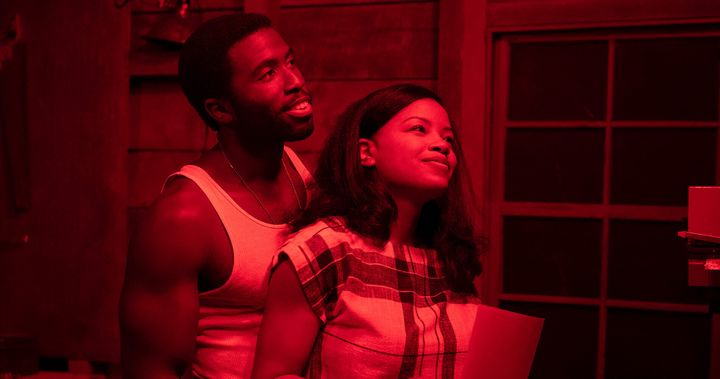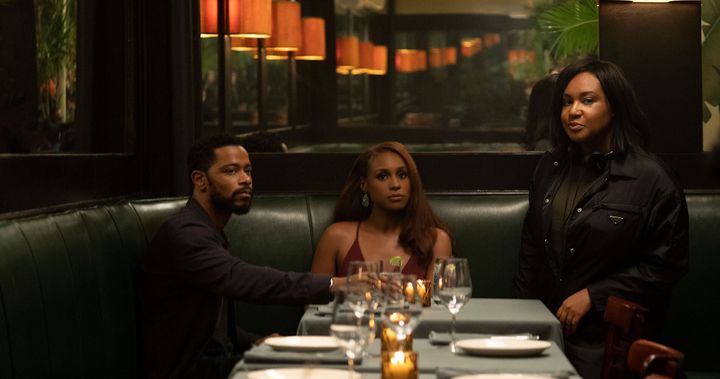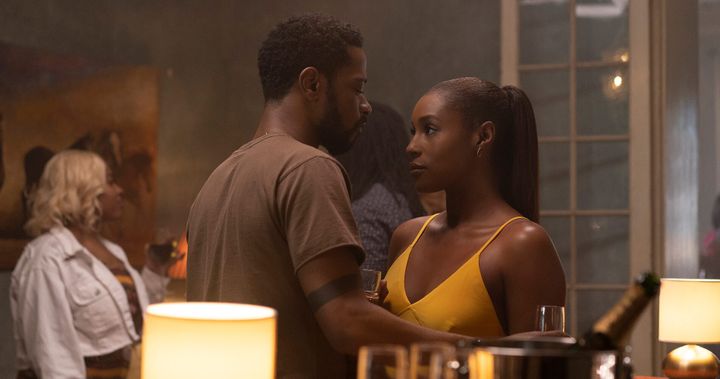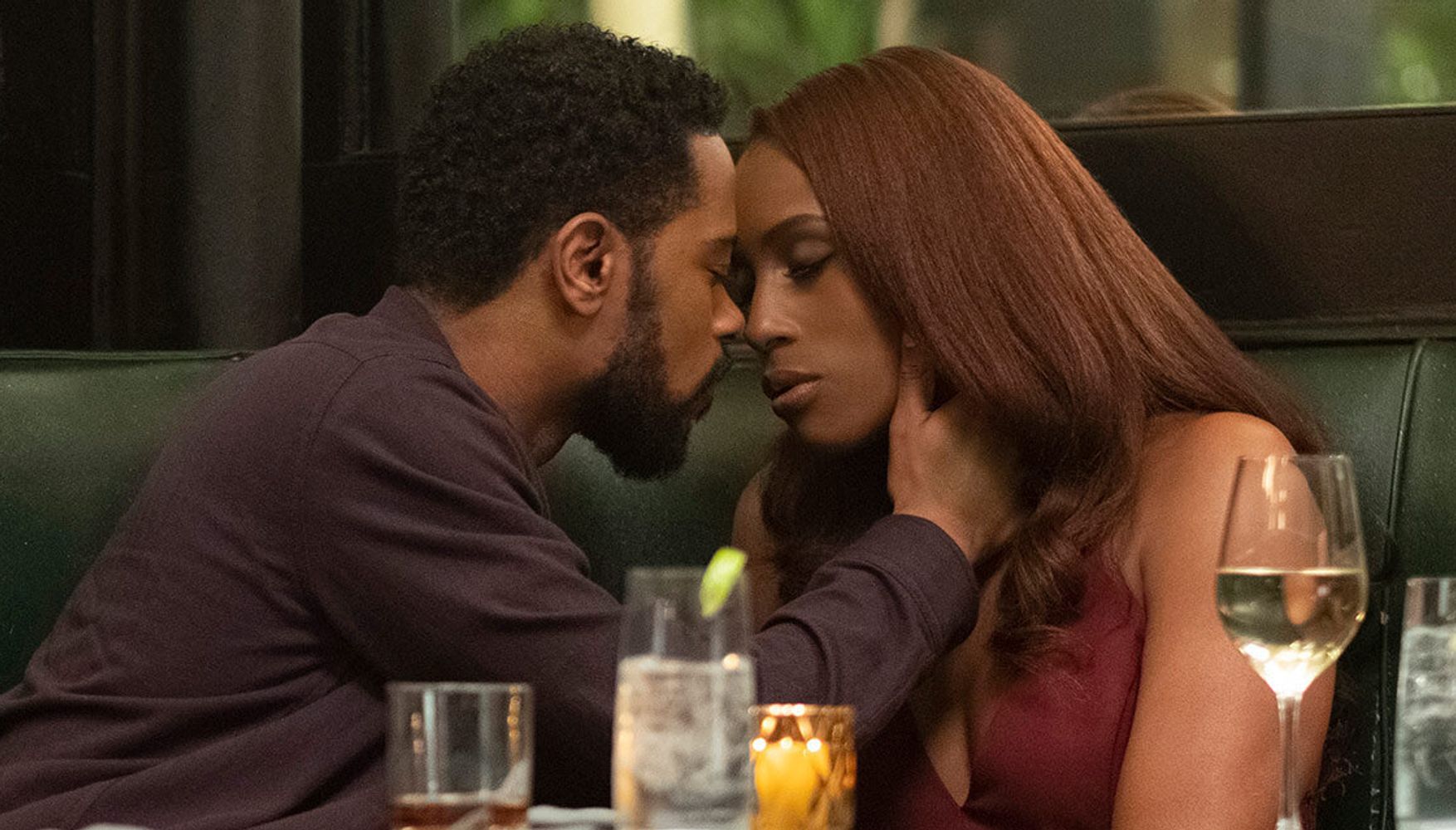[ad_1]
“The Photograph” feels like a long time coming.
The film follows two generations of love: Christina (Chanté Adams) falls in love with her beau Isaac (Y’lan Noel) but pursues a career in photography instead of settling for the housewife title. Christina’s daughter, Mae (Issa Rae), navigates a budding romance with Michael (LaKeith Stanfield) while trying to avoid making the same mistakes in love her mother did.
“The Photograph” is a dreamy, feel-good love story reminiscent of Black cinema of the late 1990s and early 2000s. It sees Black love as normal and able to exist without having to use extremes as an incubator. The love in “The Photograph” feels accessible. Though it has its funny moments, it isn’t a romantic comedy. It understands love enough to acknowledge the balance of levity and heaviness. And though its overarching tone is urgent, it isn’t seeped in trauma and pain. No one is killed, thankfully. The film’s most painful moments are caused by a longing to love or be loved. And it capitalizes on the romantic drama genre, something that audiences haven’t seen on the big screen from Black filmmakers in recent years.
Director Stella Meghie was purposeful in her approach. Inspired by her grandmother’s 30-year separation from her daughter, she based the film off one question: “What would it be like if you thought about someone every single day for 30 years but didn’t see them and love them?” Meghie loves love, so instinctually she converted the premise from familial to romantic.
“I went into this crafting this story, wanting it to be a romantic drama, wanting to tell a romantic drama,” the Toronto native told HuffPost. “And then adding that kind of family layer to it to explore how cyclical love can be, and how you love, and incorporating some of the feelings of, personally, what I was witnessing with, things that I was going through.”

“The Photograph” is Meghie’s fourth directorial effort (she worked in public relations before going to school for screenwriting). Previously she helmed “Jean of the Jones,” “The Weekend” and “Everything, Everything,” all films that explore love in different ways. Since the trailer for “The Photograph” was released late last year, folks on social media have drawn comparisons to Theodore Witcher’s “Love Jones.” The 1997 film, along with other classic Black love films, were the genesis for Meghie’s career in filmmaking.
“I mean, ‘Love Jones’ is canon,” she said. “It just stands the test of time.”
Witcher told HuffPost via email that these kinds of Black love stories that have that kind of relatability are historically rare. And that’s a big reason why “Love Jones” holds a special place in cinema, he said. It was crucial to get the perfect balance of humor, melancholy, sexuality and anger in the tone of the film, which starred Larenz Tate and Nia Long.
“The dynamic between the couple, the dilemma they have of being afraid to express what is patently obvious to everybody else — and the dynamic between the friend groups all feel very lived-in and relatable,” Witcher said. “That is largely due to the style of the film and of the acting. I tried not to amp up the story into melodrama, which can be a bit of a narrative crutch in some cases.”
Meghie grew up watching movies like “Love Jones” and “Love & Basketball” over and over again. She especially saw herself in the latter, impressed with the way Gina Prince-Bythewood approached romance and family drama.
These ’90s and early 2000s films almost feel like they belong in a time capsule. Watching them feels so damn good, which makes their absence even more evident when you go back and rewatch.
Of course, Black love stories haven’t been completely absent from cinema since the early 2000s. But with the exception of “Think Like a Man,” “Best Man Holiday” and a handful of others that have made it to the top of the box office opening weekend, Black romantic films have struggled to thrive. (“Think Like a Man” and “Best Man Holiday” opened at No. 1 at the box office and earned $96.1 million and $71.6 million, respectively.) “Deliver Us From Eva” director Gary Hardwick told Glamour that when the film industry overall backed away from romcoms, Black romantic films got hit even harder.

“Everyone suffers a little bit by comparison, but unfortunately our people tend to suffer more because there’s less product made for us in the first place,” he said. “What seems like a minor ailment to the business seems like a catastrophic ailment to us.”
With the exception of a few romantic dramas, including Prince-Bythewood’s “Beyond the Lights,” Qasim Basir’s “A Boy. A Girl. A Dream” and Tinge Krishnan’s musical drama “Been So Long,” romantic comedies have dominated narratives about Black people being in love. That doesn’t even account for indie and web series.
Witcher noted that, though romcoms are “difficult to pull off successfully,” he thinks it’s time for more adult romantic dramas to shine.
“So I’d like to see the space open up a bit for something a little more serious and a little more sophisticated with characters who are Black,” he said. “Basically the same thing I’ve always wanted to see: more variety, richer, deeper. I’d like to contribute to that if I can with the film I’m working on now.” He’s currently working on an “epic love story” with Amazon, his manager said. No further details are available to the public currently.
Recent titles have begun to give hope that the drought may be ending soon. Television has helped reopen doors to explore narratives in romantic drama with shows like Mara Brock Akil’s “Love Is” and Ava DuVernay’s “Cherish the Day.” The Oprah Winfrey Network canceled “Love Is” in the wake of domestic abuse allegations against executive producer Salim Akil. “Cherish the Day” just premiered and is waiting to hit its stride. New films also hold hope for more Black stories in the genre. Romantic dramas “Sylvie’s Love,” directed by Eugene Ashe, and “Premature,” written and directed by Rashaad Ernesto Green, were both acquired at this year and last year’s Sundance Film Festival, respectively.
With a few more options to choose from today, “The Photograph” feels special. It sets itself apart from other Will Packer-backed films that approach love on a lighter note like “Think Like a Man” and “About Last Night.” To top it off, two dark-skinned main characters get to fall in love on the big screen, something very special yet very uncommon.

“I love all of our people, but you tend to see a trend of who’s in the lead,” she said. “And I want to make sure that women that look like me and some of my friends are also seen as beautiful and seen as being worthy of filling up the screen and being worthy of being chased by a man and loved by a man. And so there was never going to be a moment where Mae was not going to look like Issa.”
Meghie isn’t the first to cast with this in mind — “If Beale Street Could Talk” and “Queen & Slim” are the most recent examples — but there is no life-threatening device holding them together or tearing them apart. Those stories are important but can leave viewers in distress. It’s the mundane kind of romance that only needs love to prove itself exciting.
After audiences watch “The Photograph,” Meghie said, she wants people not to think but to feel optimistic about love. Black audiences deserve that. She also wants there to be more room for Black filmmakers to tell even more kinds of stories, because audiences and creators deserve that, too.
“I love romantic comedies, but making sure there are more dramas, romantic dramas, making sure that for every kind of traumatic story told about our past that there is a modern-day introspective story about just growth on an everyday level,” she said. “Making sure that the cast, the leading women, leading men reflect the range of women and men in skin tone. That our culture, just creating just a wider range for us to see ourselves on the screen.”
Correction: This story has been updated to note that the mother in the film’s name is Christina.
Calling all HuffPost superfans!
Sign up for membership to become a founding member and help shape HuffPost’s next chapter
[ad_2]
Source link

